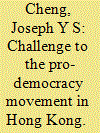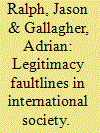| Srl | Item |
| 1 |
ID:
108804


|
|
|
| 2 |
ID:
095617


|
|
|
|
|
| Publication |
2010.
|
| Summary/Abstract |
While there is much discussion of the need for democracy in transnational institutions, there is less discussion of the conditions for their democratisation. To address this deficit, a general account of democratisation is necessary. I propose that democratisation is dependent on the joint realisation of two conditions: communicative freedom and communicative power. Democratisation thus requires, first, publics and associations in which communicative freedom is realised on the one hand; and, second, institutions that link such freedom to the exercise of communicative power to decision making on the other. In order for these conditions to be met, civil society must be expanded into the public sphere. The transformation of communicative freedom into communicative power can be promoted only by institutions that recognise the decisional status of publics, which in turn depend on civil society to generate the deliberative benefits of the plurality of perspectives. Communicative power is not merely spontaneously generated through publics, but also through publics expressly formed through democratic institutional design.
|
|
|
|
|
|
|
|
|
|
|
|
|
|
|
|
| 3 |
ID:
139590


|
|
|
|
|
| Summary/Abstract |
There is a perceived legitimacy deficit in contemporary international society. A symptom of this is the political contestation surrounding the 2011 Libyan crisis and its influence on the 2011–13 Syrian crisis. This involved criticism being levelled at the coalition led by the so-called Permanent-3 for the way they implemented the protection of civilians mandate, as well as for the referral of the Libyan situation to the International Criminal Court. How the P3 respond to these developments will be driven in part by how this ‘legitimacy fault line’ is interpreted. The purpose of this article is to first give an interpretation that is informed by the work of contemporary English School scholars and the political theorists they draw on; and second to provide the context in which specific policy recommendations may guide the response of the P3 states. We argue that because the new legitimacy fault line divides on the procedural question of who decides how international society should meet its responsibilities rather than substantive disagreements about what those responsibilities are (that is, human protection and justice) the challenge to the liberal agenda of the P3 is not radical. However, we also argue that ignoring the procedural concerns of the African and BRICS states is not outcome neutral and could in fact do harm to both the ICC and the wider implementation of R2P. We consider two proposals for procedural reform and examine how the P3 response would impact on their claim to be good international citizens.
|
|
|
|
|
|
|
|
|
|
|
|
|
|
|
|